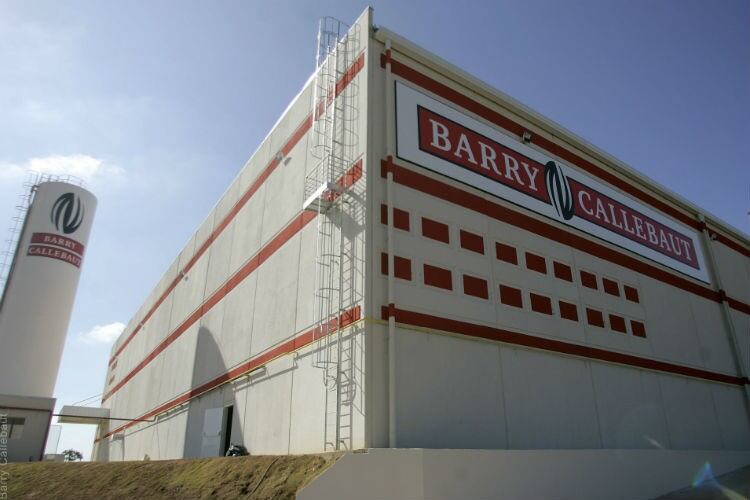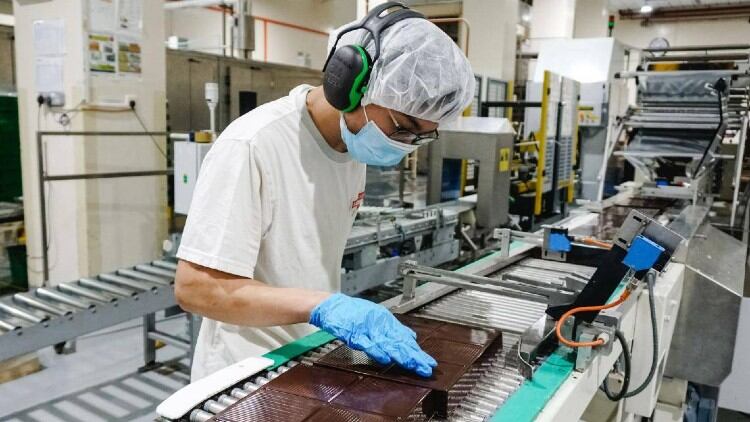The Barry Callebaut Group, the world’s leading manufacturer of premium chocolate and cocoa products, has reported a slowdown for the first six months of the year due to the coronavirus pandemic with volumes declining in the third quarter (ended 31 May, 2020) by –14.3%.
Sales volumes fell 14.3% in the third quarter of Barry Callebaut’s fiscal year 2019/20, after progressing 5.4% in the first half.
In a statement to the media it said this led to an overall decline in the Group’s sales volume of –1.3% to 1,568,878 tonnes in the first nine months of fiscal year 2019/20. Barry Callebaut said sales volumes improved in June and raised its mid-term guidance for the 3-year period starting in September.
Sales volume in the chocolate business declined by –14.1% in the third quarter, leading to a slight decline of –1.4% for the first nine months.
The underlying global chocolate confectionery market in the first nine months was flat (0.0%2) according to Nielsen. According to the Financial Times, cocoa prices have plummeted to a 22-month low on weak demand for chocolate, in a third quarter when restaurants, hotels and most shops were closed for weeks. Europe experienced the steepest decline in sales.
The knock-on effect was also reflected in the nearly halved volumes of the Group’s Gourmet & Specialties, as well as in the double-digit volume decline in Food Manufacturers.
Cocoa Living Income Differential (LID)
Regarding the Cocoa Living Income Differential (LID), which comes into effect from this month on all cocoa sales for the 2020/21 season, after Cote d’Ivoire and Ghana agreed to sell cocoa with LID premium of $400 a tonne added to the price to ease pervasive farmer poverty, Antoine de Saint-Affrique, CEO of the Barry Callebaut Group said the Group supports the initiative.
“It is very important that the money given to the farmers is being put into action in order to solve the structure of yields on cocoa farms and help triple the revenue of farmers. The LID is a tax and it will be passed on to our customers,” he told analyst on the conference call.
On the impact on chocolate consumption de Saint-Affrique said it was hard to predict at this stage because of the enormous volatility in the cocoa market. “Four weeks ago the price of cocoa was around 2,000 pounds (per tonne) a couple of days ago it was at fifteen-fifty.” But he told analysts he is not expecting a massive collapse of the market linked to the new LID which comes into effect in the next season’s crop.
Global Cocoa volumes were down –14.6% in the third quarter and about flat for the nine-month period under review (–0.7%). Sales revenue in the first nine months amounted to CHF 5.2bn ($5.54bn), an increase of +0.4% in local currencies (–4.4% in CHF), Barry Callebaut said in the statement.
“As anticipated in April, COVID-19 lockdowns across the globe impacted our sales volume in the third quarter, and herewith the good momentum of the first six months of fiscal year 2019/20. Throughout the COVID-19 pandemic, the precautionary measures we put in place early on allowed us to preserve business continuity and maintain a high service level for our customers worldwide, whilst protecting the health of our employees and the communities we operate in. We expect to emerge from the crisis with even closer relationships with our customers and suppliers, with fresh insights into innovative ways of doing business and a solid financial basis,” said de Saint-Affrique.
Key fiscals at a glance
- Sales volume down –1.3% in the first nine months, due to COVID-19 third quarter sales volume down –14.3%
- Sales revenue of CHF 5.2 billion, up +0.4% in local currencies (–4.4% in CHF)
- Signs of sales volume recovery in June, as lockdowns are easing
- Confident outlook resulting in updated mid-term guidance with increased metrics: on average, for the 3-year period 2020/21 to 2022/23, +5-7% volume growth and EBIT above volume growth in local currencies, barring any major unforeseeable events1. Updated mid-term guidance excludes fiscal year 2019/20 and starts in September 2020
COVID-19 update
Because of precautionary measures from the Group and its employees, Barry Callebaut said it is able to keep its operations running and maintain a high level of service to its customers.
In the face of the COVID-19 pandemic, the Group adopted precautionary measures early on to provide safe working environments for its employees and to maintain business continuity. In addition to the Group’s already strict hygiene standards, additional measures were put in place in factories, offices, laboratories and distribution centers, it said in the statement.
‘These measures include new hygiene protocols, social distancing on the work floor, remote working and limitation of travel. The Group also supported its employees in adjusting to the new normal’.
“We are confident we should rapidly regain momentum as markets are gradually reopening. This confidence is bolstered by the quality of our customer relationships, the breadth of our business model, as well as our strong innovation pipeline and balance sheet. The COVID-19 pandemic is a major unforeseen event which will have a negative impact on fiscal year 2019/20. This is why we update our mid-term guidance3, excluding fiscal year 2019/20 and introducing increased metrics of, on average for the 3-year period 2020/21 to 2022/23, +5-7% volume growth and EBIT above volume growth in local currencies, barring any major unforeseeable events. The updated mid-term guidance starts in September 2020,” said de Saint-Affrique.
The Group’s strategic milestones in the first nine months of fiscal year 2019/20 included:
Sustainability
In March 2020, Barry Callebaut published its 2019 progress report under the Cocoa & Forests Initiative (CFI), a multistakeholder initiative to end deforestation caused by cocoa farming in Côte d’Ivoire and Ghana. The Group mapped over 222,000 farms in Côte d’Ivoire and Ghana, and has distributed over 3 million cocoa seedlings and over 750,000 shade trees. In addition, Barry Callebaut helped to protect over 6,000 hectares of primary forest and restore 3,800 hectares of forest.
Expansion
The Group deepened its presence in Region Asia Pacific, by adding in June 2020 a fourth production line to its chocolate factory in Senoko, Singapore. The fourth production line supports Barry Callebaut as the largest producer of chocolate and cocoa products in Asia Pacific in satisfying increased demand from Southeast Asian countries, South Korea, and beyond.
In May 2020, Barry Callebaut also signed an agreement to acquire GKC Foods (Australia) Pty Ltd, a producer of chocolate, coatings and fillings, serving many consumer chocolate brands in Australia and New Zealand. The acquisition was completed in July 2020.
Also, in May 2020, Barry Callebaut signed a significant outsourcing agreement in Region Eastern Europe, Middle East and Africa (EEMEA) for the supply of compound and chocolate. The ramp-up of deliveries will start in the first quarter of fiscal year 2020/21.
Innovation
In the first nine months of the fiscal year, Ruby – the fourth type of chocolate – entered the product category of ice cream. Next to the roll-out of Magnum Ruby across the world, Starbucks introduced the 'Ruby Flamingo Frappuccino' in June 2020, available in select stores across EMEA. Ruby chocolate is now available in more than 50 markets and has been introduced by close to 100 brands.
Earlier this year, the Group’s Gourmet brand Mona Lisa introduced ‘Mona Lisa 3D Studio’, the world’s first personalized 3D printed chocolate at scale. Hotels, pastry chefs and coffee chains can soon offer customized 3-D printed chocolate made from Belgian chocolate to their customers.
In Japan, Barry Callebaut partnered with Yuraku Confectionery to raise awareness on the growing Japanese consumers’ interest in sustainability and to develop sustainable products for Japanese customers.




